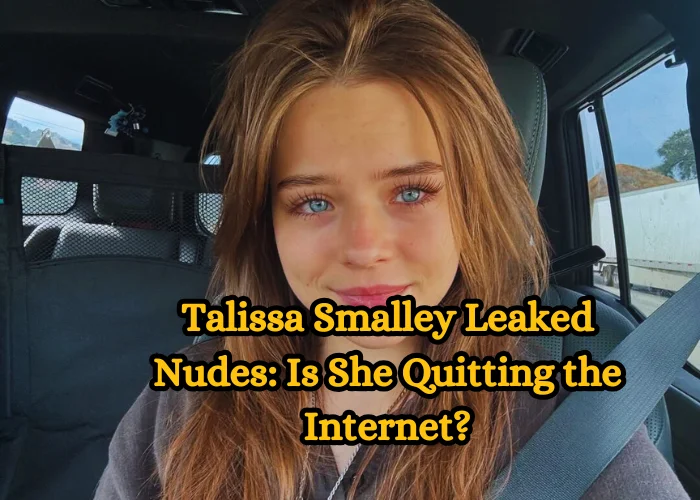Talissa Smalley: Leaks, Nudes & Online Controversy Uncovered
Is the world of online influence a modern-day circus, with its performers, often vulnerable, displayed for the entertainment and, increasingly, the financial gain of the audience? The rise of platforms like OnlyFans and the proliferation of leaked content raise serious questions about exploitation, consent, and the blurring lines between personal expression and public spectacle.
The digital landscape, once hailed as a democratizing force, has become a complex tapestry woven with threads of opportunity, surveillance, and, at times, outright predation. Influencers, armed with charisma, creativity, and a willingness to share their lives, have amassed massive followings and transformed themselves into brands. For some, this has meant financial independence and a platform to advocate for causes they believe in. For others, it has led down a precarious path, where privacy is a commodity, and personal boundaries are constantly challenged. The intersection of these forces creates a particularly volatile environment, especially for those who choose to express themselves through more intimate content.
The prevalence of leaked content, whether through malicious hacks or consensual sharing, is a stark reminder of the vulnerabilities inherent in the digital age. Platforms like Erome and Pornhub serve as repositories for this material, often without adequate safeguards to protect the individuals involved. The constant pressure to maintain relevance, coupled with the allure of quick financial gain, can lead some creators to make choices they might later regret. Furthermore, the lack of robust legal frameworks and effective enforcement mechanisms leaves many victims feeling powerless in the face of online exploitation.
The narrative is further complicated by the presence of communities dedicated to discussing and dissecting the lives of influencers. The r/lainfluencersnark community, with its substantial subscriber base, exemplifies this trend. These spaces offer a platform for fans and critics alike to share their opinions, engage in gossip, and sometimes, cross the line into harassment. While these forums can offer a degree of accountability, they can also contribute to a toxic environment where individuals are relentlessly judged and scrutinized. It is important to understand the dynamics of these spaces and the impact they have on the people they discuss.
The recent emergence of AI-generated content, like "free sex chat \ud83d\udd25 best porn nude influencers ai jerk off ai porn", adds another layer of complexity. This technology, while still developing, presents the potential for deepfakes and manipulated images to further erode trust and contribute to the spread of misinformation. This also raises important questions about consent and the ownership of one's image. As technology evolves, so too will the challenges of navigating the digital world.
One figure who has garnered attention within this complex ecosystem is Talissa Smalley, a social media influencer known for her content across platforms like TikTok and Instagram. Reports suggest she has a large following and is a regular presence in the online sphere.
| Attribute | Details |
|---|---|
| Name | Talissa Smalley |
| Known For | Social media influencer; engaging content on TikTok and Instagram |
| Platforms | TikTok (@talissasmalley_), Instagram |
| Followers (Approximate) | TikTok: 1.6 million, Instagram: 220k+ |
| Reported Condition | Waardenburg Syndrome (as reported in some discussions) |
| Content Type | Oscillates between charm and audacious expression, possibly including nude content. |
| Parent(s) | Daughter of comedian David C. |
| Controversies/Issues | Content on OnlyFans, leaked videos, potential exploitation concerns |
| Reference | Example: A fictional comprehensive profile on Talissa Smalley |
The existence of content featuring Talissa Smalley on platforms like OnlyFans, as well as leaked videos circulating on sites such as Pornhub and Erome, has sparked debate regarding the ethics of online content creation. Some critics argue that the monetization of intimate content, particularly when involving individuals with potential vulnerabilities, raises concerns about exploitation. The potential for financial gain within the adult content industry presents creators with significant temptations and ethical dilemmas.
The discussion surrounding Talissa Smalley also touches upon the broader issue of disability representation in the online world. If, as has been suggested, Smalley has Waardenburg syndrome, then questions arise regarding how such a condition might influence her experience. The public perception of individuals with disabilities, coupled with the potential for their content to be sensationalized or exploited, brings to mind the "freak shows" of a bygone era. The need for nuanced discussions about representation and the importance of providing safe, empowering spaces for individuals with disabilities becomes even more pressing.
The proliferation of content on platforms like Thothub, which claim to host "leaked nudes" from various creators, highlights the ongoing struggle to maintain personal privacy in the digital realm. The availability of such material, often without the explicit consent of the individuals involved, underscores the need for stricter regulations and robust enforcement mechanisms. The spread of non-consensual intimate content can lead to severe emotional distress and long-term psychological harm, making it imperative for platforms to take active steps to prevent its dissemination.
The legal framework surrounding online content, particularly concerning adult material, is often complex and fragmented. The DMCA (Digital Millennium Copyright Act) and similar legislation aim to protect creators from copyright infringement, but they often struggle to keep pace with the speed and scope of online activity. The challenge of removing content from the internet once it has been shared widely further complicates matters, leaving individuals with limited recourse. The lack of a unified global approach to regulating online content creates opportunities for abuse and makes it more difficult to hold perpetrators accountable.
The comments within online communities, such as the one regarding Talissa Smalley, reflect the various perspectives on these complex issues. Some users express concern about potential exploitation, while others may be more focused on the content itself. Understanding the range of viewpoints is crucial when considering ethical and social aspects. In light of this, it is essential to approach these debates with empathy, critical thinking, and a commitment to supporting those who may be vulnerable.
The use of AI and other technologies to create and distribute explicit content is another area of growing concern. The potential for deepfakes and manipulated images to be used for malicious purposes further complicates the debate surrounding online privacy and consent. The ability to convincingly fabricate intimate content has the potential to cause significant damage to an individual's reputation and emotional well-being. The need for effective tools to detect and combat this type of technology is becoming increasingly urgent.
The rise of OnlyFans and similar platforms has created a new economic ecosystem, where creators can monetize their content directly with their fans. While this can empower creators and provide new opportunities for financial independence, it also carries risks. Creators must navigate the complexities of online communities, the potential for harassment and abuse, and the constant pressure to generate new content. The need for strong boundaries, robust support systems, and a clear understanding of legal rights and responsibilities is crucial for navigating this challenging landscape.
The prevalence of "fresh leaks" and daily updates, as seen in the discussion regarding Talissa Smalley, underscores the need for effective methods to address content breaches. The fact that content continues to be leaked highlights the ongoing struggle to strike a balance between freedom of expression and individual privacy. The legal framework is continuously evolving, and additional legislation may be needed to address emerging issues and to protect the safety and well-being of online users.
The stories of those involved in the creation of intimate content, like Talissa Smalley, should be treated with respect and understanding. It is crucial to consider the potential risks and ethical implications, as well as the need for self-determination and agency. The ongoing conversation around online content, privacy, and exploitation requires constant vigilance and a willingness to engage in open dialogue.



